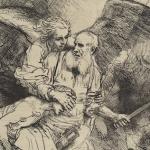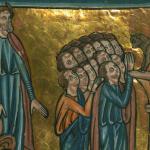Franz Rosenzweig didn’t buy Maimonides philosophical critique of the Bible’s anthropomorphism. In 1928, he wrote a short essay on the topic and, in the summary of Leora Batnitzky (Idolatry and Representation) he “argues that the tendency to rationalize away biblical anthropomorphisms . . . is both dishonest and a misunderstanding of the Bible” (21).
He charges that “the very term ‘anthropomorphism’ is laden with rationalist prejudice. Properly speaking, Rosenzweig argues, there is no ‘anthropomorphism’ in the Bible. Rather, ‘the anthropomorphisms of the Bible are throughout assertions about meetings between God and man.’ Once we understand that the Bible’s descriptions of God are about meetings that take place in time, rather than about essences that are eternal, we can understand that the Bible does not ‘assert something either about God or about man, but only about an event between the two.’ Rosenzweig argues that the philosophical problems created by ‘biblical anthropomorphisms’ are a result of a category error. The Bible is not concerned with what God is, but rather with how God acts, in time, in God’s relation to the human being” (21).
Biblical anthropomorphism is in fact testimony to the freedom of God: “What differentiates biblical monotheism is the recognition that God is infinitely free to reveal himself to the human being in any way, and at any time, that God chooses. Images can authentically represent God but no image can contain God, for the former represents God’s freedom to reveal God’s self while the latter denies precisely this. Rosenzweig concludes that the experience of fatherhood can authentically represent God’s relation to the human being, but no father is God” (22).
Thus, “not only that the Bible’s multiple images of God are not a threat to monotheism, but that they are monotheism’s most important safeguard. The Bible’s many images of God express particular encounters between the human and the divine. The variety of images of God in the Bible is constitutive of monotheism itself. These diverse and different images of God attest to God’s infinite freedom to reveal himself and the human’s infinite ability to respond to God: biblical anthropomorphisms ‘are the single protection against the backsliding into polytheism, which indeed is nothing but consolidation of a genuine present revelation of the real God to a lasting image of God precisely by this means: resisting the ever-new will of God’s revelation'” (23).












